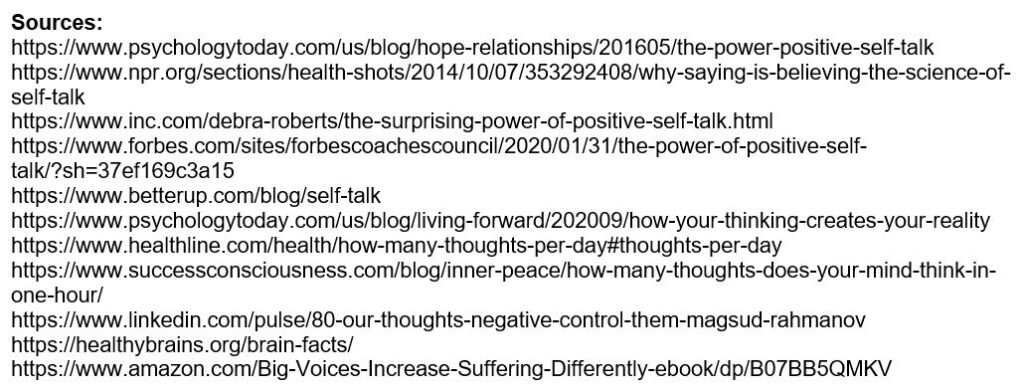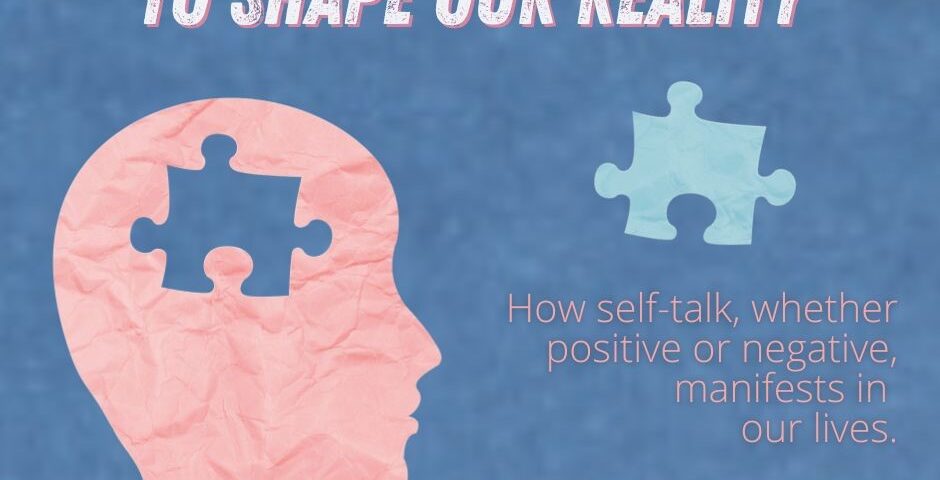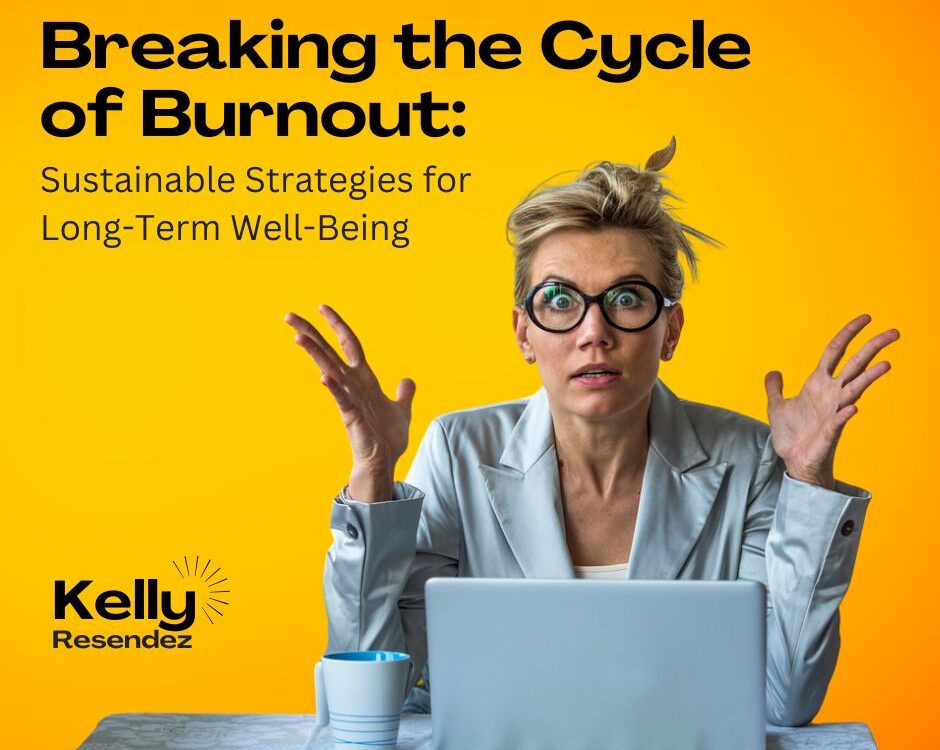
Inside LinkedIn, the biggest business network in the world.
July 14, 2022
Just Breathe: The science, facts, and health benefits behind our most vital physiological function.
September 22, 2022
“It is important to have thought mastery if we are to live an extraordinary life.”
-Kelly Resendez, Big Voices: Increase Joy, Reduce Suffering, Think Differently
Every day, human beings have thousands and thousands of thoughts. Depending on how you define a thought, they could range from an average of 6,000 all the way upwards of 50,000 per day.
The problem for most people is that about 80 percent of those thoughts will be negative, and an alarming 95 percent will be repetitive.
Some of those thoughts are accurate and even necessary. (There’s a fire – run!) But far too many are conceived only out of our internal dialogue, or negative self-talk.
Whether positive or negative, our thoughts and internal conversations have wide-reaching implications, guiding the very flow of our lives.
In my book, Big Voices: Increase Joy, Reduce Suffering, Think Differently, I wrote extensively about this theme – and the process of consciously choosing to let our most beneficial thoughts shine through. I encourage you to read that book and take full advantage of the Thought Management Strategy I detail within.
In this blog, I’ll offer just a snapshot of the nature of self-talk, the mind-manifestation connection, and examine the incredible power to change your life just by changing your thoughts.
Little Voice vs. Big Voice
Inside your mind there’s a battle between your Little Voice and your Big Voice.
Our Little Voice is synonymous with our ego. It is the voice in our heads we have lived with for all of our lives, either consciously or unconsciously. It is also the cause of most of our internal suffering.
Our ego speaks to us through our Little Voice. It says hurtful things about us and about others. It is consumed with the past and the future and doesn’t want us to be present. Our ego creates disruptions by shifting our focus to perceptions and not facts. It creates opinions about past events and manufactures stories that may or may not be true.
Your Big Voice, however, presents action-oriented and purpose-driven thoughts that bring you closer to God and your goals. They come from deep within you and are aligned with your values and priorities.
After you understand your brain and mindfulness better, you will learn the difference between your Little Voice and your Big Voice.
What is self-talk?
Self-talk is the internal dialogue we all have, the stream of thoughts and, too often, critiques we have running through our minds – both our Little Voices and Big Voices.
These internal messages have a huge bearing on the lens through which we perceive the world and how we respond, therefore altering the very direction that our lives take.
Unfortunately, our self-talk is often negative. Studies show that for many people, unnecessarily pessimistic or “dark cloud” thoughts consume up to 80 percent of their internal dialogue. For other people, that percentage is much higher.
That’s because the frontal lobe within our brain is overactive and is constantly trying to make predictions to keep us safe and free from being hurt. Our ego uses this simulator to assess rejection, failure, and frustration in an effort to protect us from disappointment.
The seed of those messages often originated in early childhood, as we internalized and magnified the hurtful or limiting words our teachers, parents, peers, or, later, relationship partners told us.
As those negative messages replay in our heads throughout the years, they trigger a host of harmful emotions like anger, guilt, stress, and sadness.
Ruminating
Your brain is wired to think repetitively, called rumination. In essence, rumination means that it is difficult for your brain to move past something that causes anxiety or concern.
Unless you are mindful of this, it may take over. Our repetitive thoughts can control our choices and bring us real emotional distress. These thoughts are not a part of your true authentic self but rather are predictable patterns from your past.
Research shows that excessive ruminating and negative self-talk can manifest as:
· Chronic stress
· Anxiety, depression, and panic disorders
· Low self-esteem
· Poor sleep
· Inability to connect with others
· Failed relationships
· Poor communication skills
· Weight gain and bad eating habits
· Abuse of drugs and alcohol
· Falling short of your potential when it comes to your career or income
Of course, thinking through our problems and analyzing feedback is vital. But the problem comes when we focus only on the negative and put it on a continuous loop.
The benefits of positive self-talk
Just as negative self-talk has a profound effect on your mind, health, and, eventually, the very course of your life, so does tuning in more to your Big Voice and positive self-talk.
According to research, the tangible benefits of positive self-talk may include:
· Helping to manage stress
· Better mental health
· A boost to the immune system
· Reductions in pain
· Improved cardiovascular health
· Increased self-esteem
· Higher levels of joy and fulfillment
· Improved vitality and physical well-being
· A longer lifespan
· Improved interpersonal relationships
How our thoughts become reality
We tend to write the story of what our own lives will look like. We do this in many ways, but it all comes back to the self-image we’ve created and reinforced through self-talk – which voice we’re giving power to.
We filter all external stimuli and experiences in our lives based on those self-created narratives. In that way, they guide the very course of our actions.
For instance, if we expect rejection, our body language, energy, anxiety, tone, choice of words, and the actions we take may all drive us in that direction.
When we expect to struggle with our career and money, we lower our expectations and self-impose limitations that will only prove that to be true. When we expect relationships to fail from the start, they often fail – or we choose partners and take actions to ensure that outcome.
Each and every one of our choices create momentum, ushering us towards a self-fulfilling prophecy.
The mind-manifestation connection
Whatever we’re seeking in the world, we tend to find. We do so through a process called filtering where we are more apt to notice evidence from our environment that’s consistent with our belief system, or “priming.”
So, when the mind has a deeply entrenched belief, it seeks evidence from our environment that reinforces that belief. Incredibly, our brains will actually shut down competing neural networks that may hold evidence to the contrary!
This is the same reason why confirmation bias is such a powerful (and dangerous) phenomenon.
Final thoughts
You have the power to lead a far better life simply by changing your self-talk.
Start with the decision to write a new story, then your plan will begin to unfold. Tune into your Big Voice and turn the volume way down on your Little Voice.
You will need to be committed to change but not expect your old programming or thoughts to ever go away. You will learn instead how to overcome them and take away their power.
Consistently choosing the right thoughts, the thoughts that come to use from our Big Voice, is not as simple as flipping a switch. It takes practice and vigilance.
But I promise that the results will be truly transformative!
***




